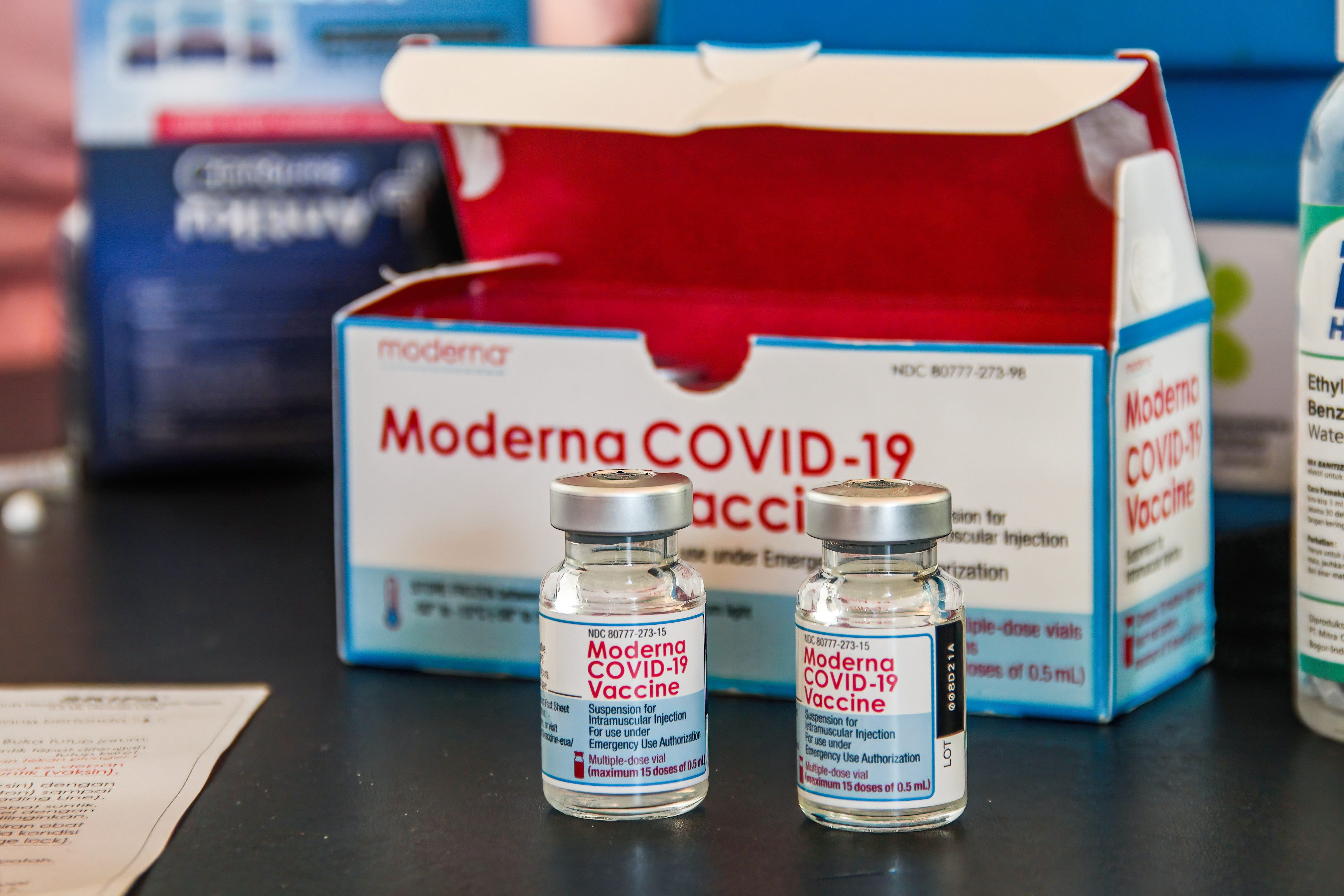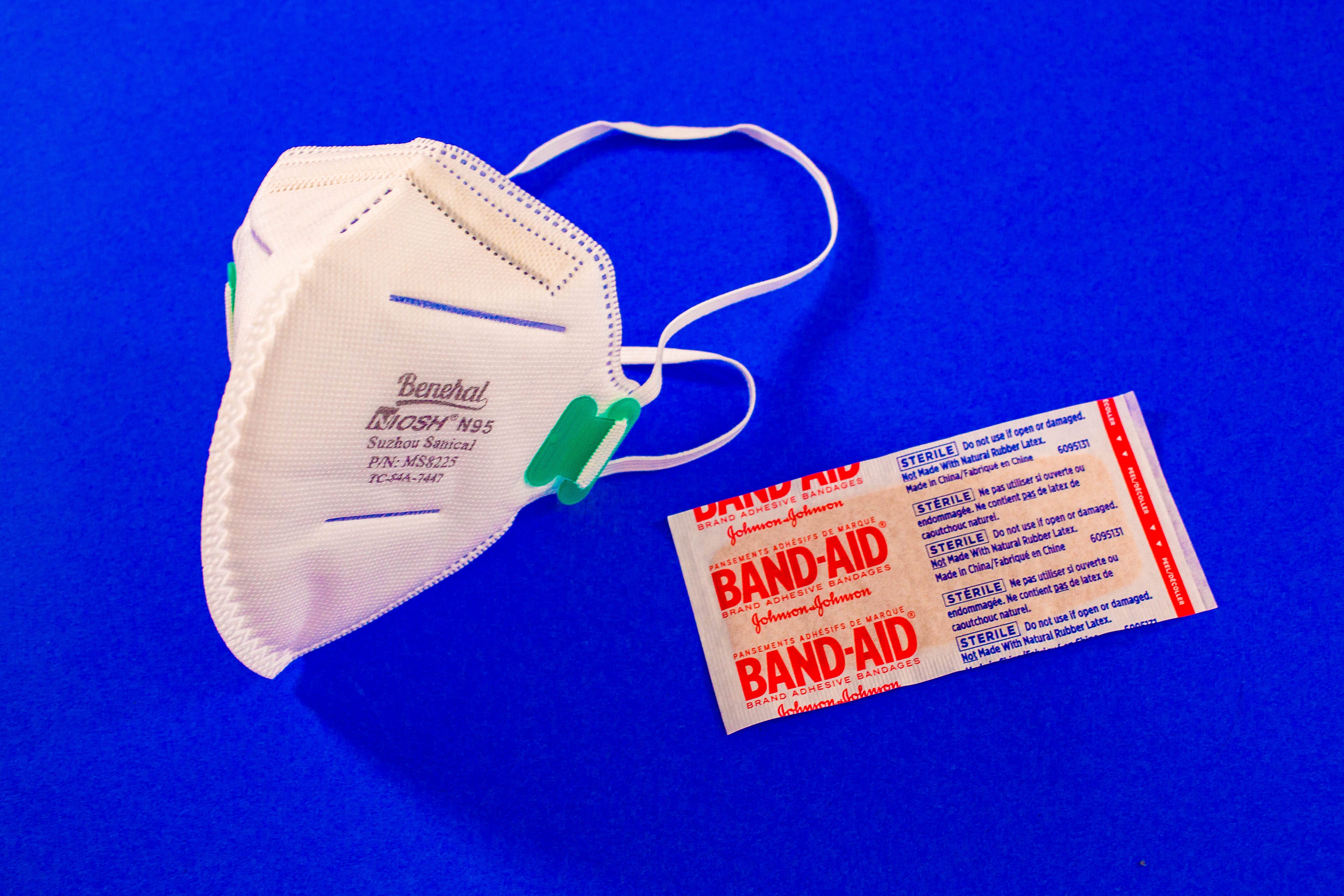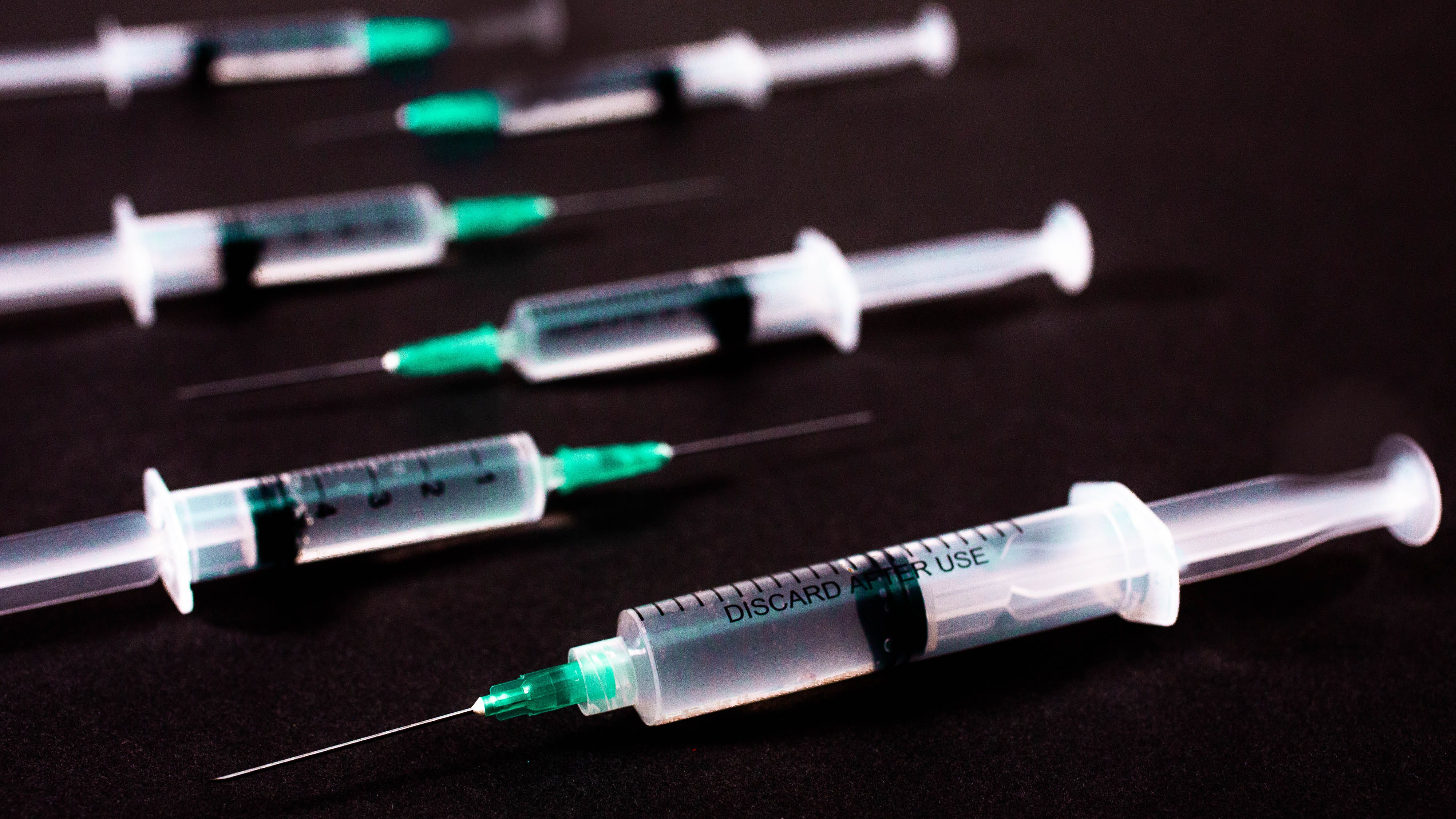

The Moderna COVID-19 booster shots contain a half-dose of the vaccine.
Algi Febri Sugita/Getty Images
COVID-19 booster shots improve protection against the coronavirus and lower the risk of hospitalization and death, even from the more contagious omicron variant. Research released by the UK on Friday continues to demonstrate the importance of boosters. The UK Health Security Agency’s report notes that 20 weeks after the second dose of mRNA vaccines, protection against the omicron variant decreases to only 10%, with a third booster dose bringing protection back up to 90%.
The UK report also strengthened the case for the Moderna booster, noting that protection against omicron was higher in those who received a Moderna booster after two Pfizer shots compared to those who received a third Pfizer shot. The Moderna booster was also slightly more effective than Pfizer for people who received two doses of the AstraZeneca vaccine.
However, the report also reconfirmed that booster potency decreases significantly after 10 weeks: Depending on the combination of vaccines administered, booster effectiveness generally decreases from about 60% to 70% protection, at two to four weeks after a booster shot is administered, to 35% to 45% at the 10-week mark.
In a bright spot, the report brought more hope that the omicron variant of COVID-19 may be less deadly than delta. The risk of hospitalization from omicron was shown to be one-third that of delta.
Also on Friday, Kenyan Prime Minister Uhuru Kenyatta announced a booster plan starting Jan. 1, focusing on all Kenyans who completed their primary vaccinations in the last six months. Kenyatta and Kenyan Chief Justice Martha Koome both received the Moderna booster at the State House on Friday, according to PulseLive Kenya.
Almost 68 million Americans have been boosted as of Dec. 30, according to the Centers for Disease Control and Prevention. That’s only 33% of the roughly 205 million Americans who received initial vaccinations for COVID-19. The increased focus on boosters comes as the omicron variant forces the CDC, health officials and government officials to reconsider what it means to be “fully vaccinated.”
The CDC urges anyone 16 years or older to get a booster six months after their second dose of Moderna or Pfizer. The CDC also recommends a booster for adolescents 12 and up who have a weakened immune system, are undergoing cancer treatment or have certain other health conditions.
On Dec. 16, a CDC advisory committee recommended Moderna’s Spikevax and Pfizer’s Comirnaty (both mRNA vaccines), over Johnson & Johnson’s one-jab carrier (viral vector) vaccine. The CDC’s preference of mRNA vaccines also applies to booster shots.
Countries such as Germany, Israel and the UK are weighing a possible fourth booster, and Dr. Anthony Fauci, chief medical adviser to President Joe Biden, said a fourth jab was “conceivable” in the US, too.
“It is conceivable that in the future we might need an additional shot, but right now, we are hoping that we will get a greater degree of durability of protection from that booster shot,” Fauci said at a White House briefing Wednesday. “So we’re going to take one step at a time, get the data from the third boost and then make decisions based on scientific data.”
So far, the vaccines have proven highly effective in preventing serious reactions and death from COVID-19. People who are unvaccinated are 10 times more likely to be hospitalized if infected. With a federal vaccine mandate slated to start next month, the Biden administration expects even more Americans to get the jab.
Here’s what you need to know about the Moderna booster, including doses, side effects and how to get a free ride to your vaccination appointment. For even more details, here’s the latest on COVID-19 vaccines for kids, how you can soon get a free COVID-19 test kit and what to know about breakthrough infections.
How effective is the Moderna booster against the omicron variant?
On Dec. 20, Moderna President Stephen Hoge said early results demonstrated the company’s COVID-19 vaccine booster increased “omicron-neutralizing antibodies” approximately 37-fold. For comparison, earlier this month Pfizer said its booster raises antibody levels 25-fold, offering “a sufficient level of protection” against omicron.
Early studies of omicron variant infections in the US support the idea that current vaccines offer weaker protection against the newest strain, especially for individuals who did not get a booster yet.
Dr. Rochelle P. Walensky, CDC director, said Dec. 10 that of the 43 earliest cases attributed to the omicron variant, 34 people had been fully vaccinated, though only 14 of those patients had also received a booster. And five of the people who were boosted were infected less than 14 days after the third shot — thus, before full protection kicks in.
Is Moderna working on additional COVID vaccine boosters?
Hoge said the company’s current 50-microgram COVID booster gives “quite respectable” protection. The company is continuing to study an omicron-specific vaccine and a multivalent one that could protect against other variants, including the alpha and delta strains, in case either is needed.
The company also said a 100-microgram version of its current vaccine, Spikevax, appears to raise antibody protection 83-fold. Hoge said Moderna could have new versions of its vaccine ready early in 2022, but is not yet planning to ask the CDC and US Food and Drug Administration to amend its booster authorization for the 100-microgram trial version of Spikevax.
Will we need an annual COVID booster shot?
With vaccines appearing to offer waning protection and the continuing evolution of variants, Hoge said we will most likely need seasonal COVID boosters, much like we do with the flu, at least to protect those at high risk of infection.
The CDC updated its guidance to indicate that, starting in 2022, some immunocompromised people will be able to get a fourth COVID-19 booster shot.
When can I get a COVID-19 vaccine booster shot?
If you got a Moderna or Pfizer jab, you’re eligible for a booster six months after the date of the second shot listed on your vaccination card. If you got the one-shot Johnson & Johnson vaccine, you’ll want a booster two months later (more below).
The CDC and other health authorities are now urging people to get boosters as soon as they’re eligible, to keep the immune response against omicron, delta and other coronavirus variants of concern as strong as possible.
On Dec. 2, Biden outlined a plan for Medicare to contact the 64 million people it serves and for AARP to reach out to its 38 million members about getting a booster shot. And nationwide pharmacy chains like Walgreens, CVS and Rite Aid are contacting customers who got a vaccine at their stores when it’s time to schedule a booster.
Some countries, including Germany and South Korea, have reduced the waiting time for booster shots to 3 months. In August, President Biden discussed the possibility of reducing the waiting period for booster shots, but no explicit action has been taken by US officials yet.
Should people who are pregnant get a booster shot?
The COVID-19 booster recommendations apply to all people 18 years and older, including those who are pregnant. The CDC urges pregnant people to get a COVID-19 vaccine, and a booster is half a full vaccine dose.
“People who are pregnant or recently pregnant are more likely to get severely ill with COVID-19 compared with people who are not pregnant,” the CDC website says.
While there is no evidence that getting vaccinated decreases fertility in women or men, a recent study linked COVID-19 infection in pregnant women to a higher risk of stillbirth.
Is the Moderna booster shot a third dose of the vaccine?
Booster shots of COVID-19 vaccines are currently half doses of the same vaccine used in the first two full shots. The goal is to top up the formula and reinforce the body’s immune response against the virus and its variants. While the first two shots of the Moderna vaccine were each 100 micrograms, for example, the booster is a 50-microgram dose.
Moderna said a 100-microgram version of its current vaccine, Spikevax, appears to raise antibody protection 83-fold but it is not yet planning to ask the CDC or FDA to approve the more potent booster.
Moderna is also working on a combination shot that contains this year’s flu vaccine and its COVID-19 booster vaccine, but that’s not available right now.

Moderna’s booster shot is currently half the size of a full dose.
Sarah Tew/CNET
How do I know which pharmacies have Moderna booster shots available?
Boosters are available at roughly 80,000 locations across the US, including over 40,000 pharmacies. Some 90% of Americans have a vaccine site within five miles of where they live.
A free service backed by the CDC sends you information on vaccine sites when you text your ZIP code to this number: 438829. The response will show you COVID-19 vaccine locations in your area, along with the brands they carry for certain age groups, for instance, Moderna 18+. This can save you from having to call around, or show up to an appointment to find that your booster of choice isn’t available. The text message also offers a shortcut to make your appointment right from your phone screen.
In addition, you can check Vaccines.gov to see which vaccines are available where, or call 800-232-0233 for additional vaccine information.
How can I get a free ride to get my booster shot?
Lyft and Uber are offering free rides for some people who need them. An easy way to access those links for more information is through the text feature above. You can also go to Lyft.com/vax or call Uber at 855-921-0033.
Who can get a Moderna booster shot right now?
On Nov. 19, all US adults 18 and older became eligible to receive COVID-19 booster shots if it’s been at least six months since they’ve received a second dose of either the Moderna or Pfizer vaccine. Those who received the Johnson & Johnson vaccine are eligible for a booster dose after two months.
Adults are encouraged to get whatever booster dose is available, even if that means mixing and matching vaccine boosters (more below). The CDC’s recommendation of mRNA vaccines — Moderna or Pfizer — also applies to booster shots.
What are the side effects of Moderna’s booster?
Moderna says possible side effects for its booster shot are similar to those from the two primary doses, and include pain or swelling at the injection site, as well as fatigue, muscle pain, headache, fever, chills and nausea.
The good news is, according to the CDC, those who got the Moderna booster dose reported far fewer reactions than they did after the second dose of the vaccine.

Moderna’s booster shot is free of charge for all adults.
Sarah Tew/CNET
Is it safe to mix and match vaccine and booster brands?
Yes. The FDA has authorized mixing COVID-19 boosters, which in the US means Moderna and Pfizer. Any adult eligible for a booster can get any of the available brands of coronavirus vaccines. If you initially received Johnson & Johnson and it’s been two months or longer since you received the initial dose, you’ll be able to get the Moderna or Pfizer booster. If you received Moderna or Pfizer for your first two shots, you could pick any authorized vaccine available to you, if you qualify and it’s been six months or longer since your second shot.
In its study, the CDC found 95% of those who got Moderna for the first round of vaccine shots chose Moderna for the booster dose.
Is the Moderna COVID-19 booster shot still free?
All booster shots will be free, regardless of immigration or health insurance status. However, depending on where you get your booster shot — for example, at a local pharmacy — you may be asked to provide your insurance card information, including your name, date of birth and membership number. But you will not be charged for your COVID-19 vaccine or booster shot.
What does the Moderna booster shot do?
As the vaccine’s effectiveness decreases over time, a COVID-19 booster shot — whether from Moderna, Pfizer or Johnson & Johnson — recharges your body’s immune response and guards against a breakthrough infection.
Recent studies of the Pfizer and AstraZeneca vaccines show that their effectiveness can begin to wane after six months. Moderna said early data suggests that those who received the Moderna vaccine in 2020 are showing a higher rate of breakthrough COVID-19 infections than those vaccinated this year, suggesting the need for a booster to maintain high levels of protection.
For more on coronavirus treatments and vaccines, here’s what we know about monoclonal antibody treatments, the new federal vaccine mandates and why some people may not want the shot.
The information contained in this article is for educational and informational purposes only and is not intended as health or medical advice. Always consult a physician or other qualified health provider regarding any questions you may have about a medical condition or health objectives.

